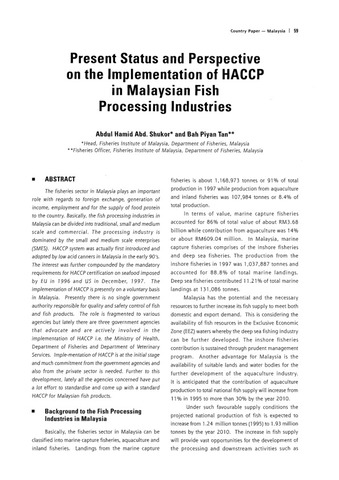Present status and perspective on the implementation of HACCP in Malaysian fish processing industries

ရက်စွဲ
2001Page views
622
Share
စိတ္တဇ
The fisheries sector in Malaysia plays an important role with regards to foreign exchange, generation of income, employment and for the supply of food protein to the country. Basically, the fish processing industries in Malaysia can be divided into traditional, small and medium scale and commercial. The processing industry is dominated by the small and medium scale enterprises (SMES). HACCP system was actually first introduced and adopted by low acid canners in Malaysia in the early 90's. The interest was further compounded by the mandatory requirements for HACCP certification on seafood imposed by EU in 1996 and US in December, 1997. The implementation of HACCP is presently on a voluntary basis in Malaysia. Presently there is no single government authority responsible for quality and safety control of fish and fish products. The role is fragmented to various agencies but lately there are three government agencies that advocate and are actively involved in the implementation of HACCP i.e. the Ministry of Health, Department of Fisheries and Department of Veterinary Services. Implementation of HACCP is at the initial stage and much commitment from the government agencies and also from the private sector is needed. Further to this development, lately all the agencies concerned have put a lot effort to standardise and come up with a standard HACCP for Malaysian fish products.
Suggested Citation
Shukor, A. H. A., & Tan, B. P. (2001). Present status and perspective on the implementation of HACCP in Malaysian fish processing industries. In S. E. Yeap & T. N. Kok (Eds.), Proceedings of the 1st Regional Workshop on the Application of HACCP in the Fish Processing Industry in Southeast Asia, 28 August-1 September 2000, Singapore (pp. 59-65). Singapore: Marine Fisheries Research Department, Southeast Asian Fisheries Development Center.
